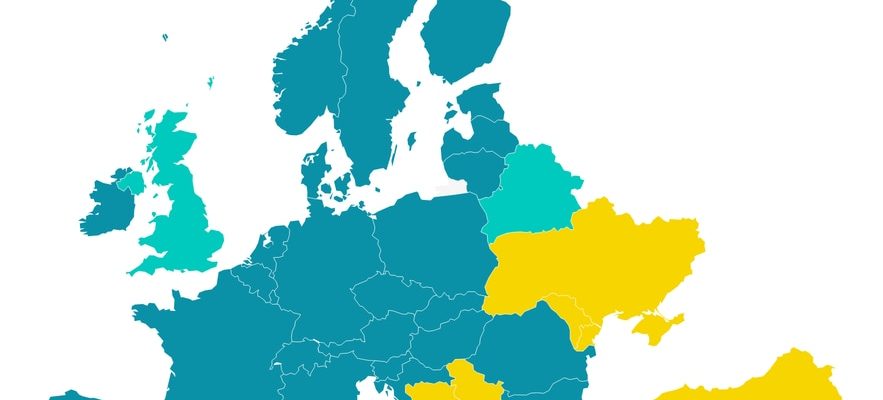Moldova wants to join the European Union “as soon as possible” to protect itself from the Russian threat. The president of the country called on the 27 to take a decision “in the coming months” on the opening of accession negotiations, this Thursday, May 18 in an interview with AFP. It is the fear of being the next target of Russia that encourages this small country of 2.6 million inhabitants to push its candidacy. “Of course, nothing compares to what is happening in Ukraine, but we see the risk and we believe that we can only save our democracy by being part of the EU,” said Maia Sandu, a few days of a pro-European demonstration followed by an unprecedented European summit in Chisinau.
The former Soviet republic had applied for membership on March 3, 2022, the same day as Georgia – and three days after Ukraine. Both Ukraine and Moldova were granted official “candidate for membership” status on June 23, following a record review process, against the backdrop of the deadly invasion of Ukraine. by Russia.
© / Data Wrapper
Eight countries facing the Copenhagen criteria
The two countries thus join the list of eight candidate nations for membership, as does Bosnia and Herzegovina, which was awarded candidate status after six years of examination in December 2022. But also Albania (since 2009 ), North Macedonia (2004), Montenegro (2008), Serbia (2009) and Turkey (1987). Iceland, for its part, withdrew its application in 2015, submitted in 2009. The processing of the application for membership can take many years: Hungary and Poland, for example, were able to integrate into the EU after 10 years of waiting, in 2004.
The membership rules are defined by the “Copenhagen criteria” established in 1993, and by Article 49 of the Maastricht Treaty. Among these criteria, the establishment of “stable institutions guaranteeing the rule of law, democracy, human rights, respect for minorities and their protection”, but also a viable and competitive market economy within the Union, as well as the capacity to assume the political, economic and monetary objectives of the European Union, and to apply European legislation.
Ukraine’s express request
Ukraine nevertheless believes that it already meets these criteria, and “deserves to begin negotiations this year concerning its accession to the EU”, judged in February its President Volodymyr Zelensky. He hopes to be able to benefit from a particularly fast processing time, in particular due to the urgency of the Russian invasion, for membership as early as 2024.
However, there is little chance that this deadline will be met: as early as last June, the former Minister for Europe Clément Beaune had stressed that there would be “no accelerated procedure or privilege”. Before adding that before the country can integrate the EU, it would be necessary “of course to end the war, to rebuild the country, to level up on the democratic and economic requirement”. According to many specialists, Ukraine does not currently meet the requirements of the Copenhagen criteria.
Progress has nevertheless been noted: last December the country voted a “media law” supposed to reform and guarantee the independence of the media regulator in the country, and restrict the influence of the oligarchs on them. The EU had advised Ukraine to reform its legislation in this area. Efforts are still required by Brussels in terms of the fight against money laundering and corruption. After the war, the country will also have to prove the stability of its democratic regime.
Several countries still far from the goal
Overall, the European Union is increasingly favorable to its enlargement. In 2017, it published a strategy named “credible enlargement perspective and commitment of theEuropean Union reinforced for western balkans“. A policy pursued by the EU with its candidates aims to support the transformation of the Balkans so that they correspond to European values.
But some countries are still too far removed from European values to consider joining in the medium term. Kosovo and Georgia are still not recognized as official candidates, due in particular to the fragility of the political system or conflicts with their neighbours. Turkey, for its part, a candidate for 36 years and entered into negotiations (now at a standstill) since 2005, seems to have largely moved away from this objective since 2015, by intensifying its repression of the Kurdish people and by pursuing particularly aggressive policies. in Syria or Syria, but also by getting closer commercially and politically to Moscow and Vladimir Putin despite the start of the invasion of Ukraine.
